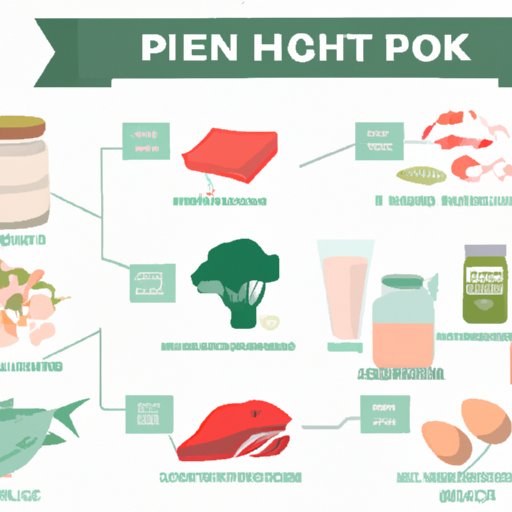
Introduction
A high protein diet typically consists of foods high in protein, like meat, fish, eggs, dairy, and legumes. This type of diet emphasizes protein intake while limiting the intake of carbohydrates and fats.
The purpose of this article is to provide information about high protein diets for people who are interested in improving their health or achieving certain health goals, such as losing weight or building muscle.
In this article, we will cover the benefits and drawbacks of a high protein diet, provide a list of high protein foods, discuss evidence-based research on the effectiveness of high protein diets, and offer meal plans with high protein options.
Benefits of High Protein Diet
One of the biggest benefits of a high protein diet is weight management. Eating protein-rich foods can help you feel fuller for longer, reducing the urge to overeat and helping you maintain a healthy weight.
In addition to weight management, a high protein diet can benefit people who want to build muscle. Protein is essential for muscle growth and repair, making it an important nutrient for athletes and bodybuilders.
Another benefit of a high protein diet is increased energy levels. When you eat protein, your body breaks it down into amino acids, which are used to build and repair tissues in your body. This process requires energy, which can boost your overall energy levels.
High Protein Foods
There are many different high protein foods that people can incorporate into their daily diet. Some examples include:
- Lean meats (chicken, turkey, beef, pork)
- Fish and seafood
- Eggs
- Greek yogurt
- Cottage cheese
- Lentils
- Beans
By including these foods in your meals and snacks, you can easily meet your daily protein intake.
Potential Drawbacks of High Protein Diet
While there are many benefits to a high protein diet, there are also potential risks to be aware of. One potential risk is kidney damage, especially for people with pre-existing kidney problems. High protein diets can also cause constipation and nutrient deficiencies if not planned properly.
However, these risks can be mitigated through proper planning and meal selection. It’s important to consult with a healthcare provider or registered dietitian before starting a high protein diet to ensure that it’s safe and balanced for your needs.
Evidence-based Research
There is a growing body of scientific research that supports the benefits of high protein diets for various populations. For example, a study published in the American Journal of Clinical Nutrition found that a high protein diet was effective for weight loss and improved body composition in overweight and obese individuals.
Another study published in the Journal of the International Society of Sports Nutrition found that a high protein diet helped athletes increase muscle mass and improve performance.
These studies suggest that a high protein diet can be an effective tool for achieving various health goals.
Comparison with Other Diets
High protein diets differ from other popular diets such as low carb, keto, and vegetarian/vegan diets. Low carb and keto diets emphasize reducing carbohydrates and increasing fat intake, while vegetarian and vegan diets eliminate animal products altogether.
While these diets have their own unique advantages, a high protein diet can offer benefits that are not found in other diets, such as increased muscle growth and energy levels.
Meal Plans with High Protein Options
To help you get started with a high protein diet, here are some meal plans with high protein options:
Breakfast
- 2 eggs with spinach and mushrooms
- High-protein smoothie with Greek yogurt, berries, and almond milk
- Protein pancakes made with whey protein and whole grain flour
Lunch
- Grilled chicken breast salad with mixed greens and avocado
- Tuna salad with whole-grain bread
- Lentil and vegetable soup with whole-grain crackers
Dinner
- Grilled salmon with roasted vegetables
- Beef stir-fry with brown rice and vegetables
- Vegetable omelet with a side of sweet potato
Snacks
- Hard-boiled eggs
- Protein bars
- Roasted chickpeas
Personal Testimonials
Here are some personal stories from people who have successfully followed a high protein diet:
- “I started eating more protein and less carbs, and within a few weeks, I noticed a big difference in how I looked and felt. I have more energy and I’m not hungry all the time like I used to be.” – John
- “I’m a bodybuilder, and a high protein diet is essential for building muscle. I eat protein with every meal and supplement with protein shakes, and it’s helped me achieve my fitness goals.” – Sarah
These stories demonstrate how a high protein diet can be effective for achieving various health and fitness goals.
Conclusion
A high protein diet can offer many benefits, including weight management, increased energy levels, and muscle growth. However, it’s important to be aware of the potential risks and to consult with a healthcare provider or registered dietitian before starting a high protein diet.
By incorporating high protein foods into your meals and snacks, you can easily meet your daily protein needs and achieve your health and fitness goals.
Remember to seek out professional advice before making any major dietary changes.




